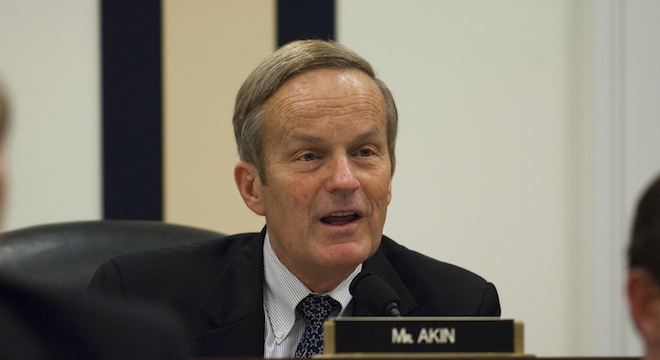The World Conference on International Telecommunications, an international summit scheduled to be hosted by the United Nations telecom agency, is still over four months away, but Republicans aren’t waisting any time in expressing their opposition to it.
In a letter sent to Secretary of State Hillary Clinton, no less than 20 Republican members of the House call upon the Secretary to oppose newly proposed Internet regulations from China, Russia and Iran that may be brought up at the conference. In lieu of that, Republicans want Clinton to “form a coalition with other freedom loving countries to put an end” to the conference overall.
“The idea of the U.N. regulating the internet is deeply disturbing and should be opposed in every possible way,” said Congressman Todd Arkin (R-MO), the lead signatory on the letter, in a statement posted on his website along with the letter on Thursday. Arkin continued:
“My colleagues and I are joining together to send a clear message to the administration that they must not allow U.N. regulation of the internet. The internet has proven to be an amazing benefit to America and the rest of the world over the last few decades. As a nation, we cannot stand idly by as the freedom of the internet comes under assault.”
The letter isn’t the first time House Republicans have come out swinging against the ITU conference: In late May the House held hearings on the matter, with Rep. Fred Upton (R-MI) blasting the proposals as “terrible ideas.” June Rep. Mary Bono Mack (R-CA) introduced a resolution to solidify the official stance of the U.S. delegates going into the conference as one opposed to any new international Internet regulations.
The U.N. agency in charge of the conference, the International Telecommunications Union (ITU), has repeatedly stated that it does not have the mandate, nor the power, nor even the desire to actually regulate the Internet itself.
“Internet governance is not an issue at this conference,” ITU spokesperson Sarah Parkes told TPM in June.
Instead, the ITU says that the conference is merely meant to allow the 193 member nations that make up the United Nations and the ITU body itself to get together in Dubai to update a 1988 treaty on international telecommunication standards. That treaty, known as the International Telecommunications Regulations (ITRs), helped to ensure many telecommunications systems at the time — including long-distance calling, radio and TV — worked across national borders.
But it also facilitated the practice of phone companies charging the originators of international telephone traffic.
Now that some 24 years have passed since that original treaty, the ITU member nations are seeking to update it to address the growth of the major new telecom network that wasn’t around back then: The Internet.
U.S. lawmakers and advocacy groups are concerned about that prospect though, specifically over proposed updates floated by China, Russia, Iran and other Arab nations to codify their ability to spy on Internet users, censor traffic, or charge large, heavily-trafficked websites such as Google and Wikipedia similar to the international calling system.
The letter sent by the 20 Republicans to Secretary Clinton spells out some of these fears:
“Some of these proposals are nothing more than power grabs by totalitarian and repressive regimes. One proposal, supported by Russia and Iran, would meter Internet traffic at national boundaries, enabling countries to raise the cost of restrict access to foreign websites. Another proposal would create a legal justification for the government inspection of email. Yet another proposal, from China, would give governments the ability to enforce standards of behavior on internet networks.”
Critics of the ITU are also quick to point out that it hasn’t made any of these proposals public — as they are restricted to paying members and national delegations. Indeed, the letter from the U.S. House members acknowledges that they only learned about the proposals due to the fact that they were “leaked,” to an activist-run website known as WCITLeaks.org, named after the conference.
But the ITU recently vowed to publish what it says is its main document containing all 450 of the working proposals. Advocacy groups have said that this is not enough, and they want to see all of the original proposals, even those that have been nixed already, ahead of the December conference in Dubai.
As ITU points out, it wouldn’t stop any countries from publishing all of the documents on their own national government websites.
“There’s no way that the ITU could, would or seeks to prevent individual member nations from making these documents public,” an ITU spokesperson told TPM in a phone interview earlier this week.






